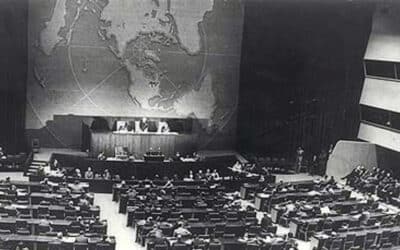One claim made by the opposition in Iran to the re-election of President Mahmoud Ahmadinejad in an attempt to paint the election as fraudulent is that there was an unusually high turnout, in some cases more than 100 percent, in many places across the country.
Citing just one example, the Guardian reported on June 17 that:
Turnouts of more than 100% were recorded in at least 30 Iranian towns in last week’s disputed presidential election, opposition sources have claimed.
In the most specific allegations of rigging yet to emerge, the centrist Ayandeh website — which stayed neutral during the campaign — reported that 26 provinces across the country showed participation figures so high they were either hitherto unheard of in democratic elections or in excess of the number of registered electors.
There are a couple of key points to emphasize here. First, this is considered “the most specific allegations of rigging yet to emerge”. In other words, at the time of this report, this was the best evidence to date. Second, the Guardian‘s source for this is being portrayed as an objective and credible one.
The Guardian provides a link to the website–in Persian. This is notable since the Guardian‘s audience is an English-speaking one, and the site has an English version. There is, however, no obvious link to the English version from the Persian one, so anybody following the link from the Guardian to view the source would be at a loss to garner any useful information from it.
From the English version, on the other hand, one is learn a bit more. At the time, for instance, one could see a prominent link to a statement from the Association of Iranian Futurists, the group behind the site, asserting that the election was a “massive fraud” that was “tantamount to a coup d’etat” and demanding that “the elections results be declared null and void”.
The day after the election of June 12, the group issued an open letter to U.S. President Barack Obama describing “the ruinous foreign and domestic policies” during President Ahmadinejad’s tenure and asserting that the certification of the election by Supreme Leader Ayatollah Khamenei was “in effect a coup d’etat”.
Such official statements of policy by the website hardly serve to lend credence to the Guardian‘s claims of the sites neutrality on the question of Iran’s election.
The website’s director and owner is Hossein Mola. He began the Iran Futurist Foundation with Sam Chandchi, who runs his own site, Iran Scope, which has a mirror site. The Ayandeh website’s name apparently comes from “Ayandehnegar”, which “futurist” or the equivalent in Persian. The platform of the Iranian Futurist party states among its goals that of a secular Iran and calls for the abolition of the current regime.
Again, whatever one may think of their platform, the claim that the group was “neutral” during the election is fairly dubious. The party and the website clearly have an agenda, for better or for worse.
Interestingly, Mola founded Radio Azadi in Sweden, according to Ghandchi’s profile on his own website. Ghandchi himself also worked for an “Azadi” (“freedom” or “liberty” in Persian) radio station that was shut down following the Islamic Revolution that overthrew the U.S.-backed Shah.
There remains an “Azadi Radio” today. While it may or may not be associated with the “Azadi” radio stations Mola or Ghandchi worked for, the chances of this being mere coincidence seem lessened by the fact that Azadi Radio and related broadcasters, like Radio Farda, are Radio Free Europe/Radio Liberty (RFE/RL) stations.
RFE/RL, like the Voice of America (VOA), are under the umbrella of the Broadcasting Board of Governors, an agency of the U.S. government.
Under U.S. law designed to protect the public from propaganda issued by its own government, RFE/RL and the VOA are forbidden from broadcasting into the U.S.
Issuing propaganda in foreign countries, of course, is perfectly “legal”.
Returning to the Guardian article, it said:
Ayandeh’s source said at least 200 polling stations across Iran recorded participation rates of 95% or above. “This is generally considered scientifically impossible because out of every given cohort of 20 voters, there will be at least one who is either ill, out of the country, has recently died or is unable to participate for some other reasons,” the source said.
What neither Ayandeh nor the Guardian — which, to be fair, stated that “The claims are impossible to verify” — saw fit to inform their readers of is that in Iran, this is not considered “scientifically impossible” because of the simple fact that voters need not have voted in their home town or district, but could vote from anywhere in Iran.
To vote, Iranians presented their national identification book, which afterward is stamped to ensure voters cannot cast more than one ballot.
Iran’s Guardian Council made no secret of the fact that voting figures in some places exceeded the number of people registered to vote in that area. As reported by state-run Press TV, a spokesman for the council, Abbas-Ali Kadkhodaei, announced, “Statistics provided by the candidates, who claim more than 100% of those eligible have cast their ballot in 80-170 cities are not accurate — the incident has happened in only 50 cities.”
Reported Press TV,
Kadkhodaei further explained that the voter turnout of above 100% in some cities is a normal phenomenon because there is no legal limitation for people to vote for the presidential elections in another city or province to which people often travel or commute.
The June 12 election was held on a Friday. This “irregularity” might be further explained by the fact that, just as Saturday is for Jews, Friday is a day of prayer for Muslims. So the weekend, unlike in the West, is typically Friday and Saturday. Needless to say, people travel more on the weekend than during the work week. Many Iranians likely also travel to be with family for the Muslim Sabbath.


